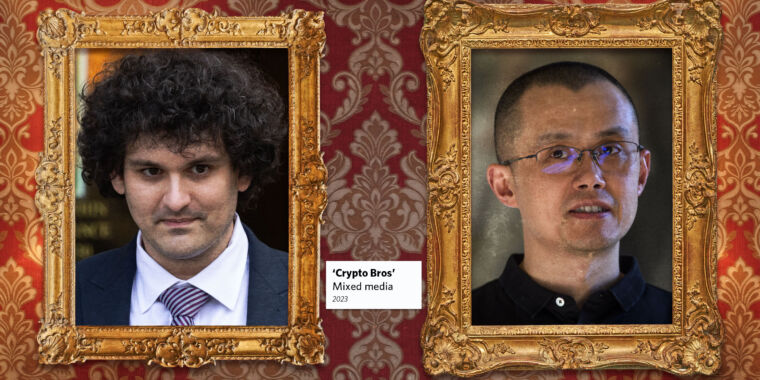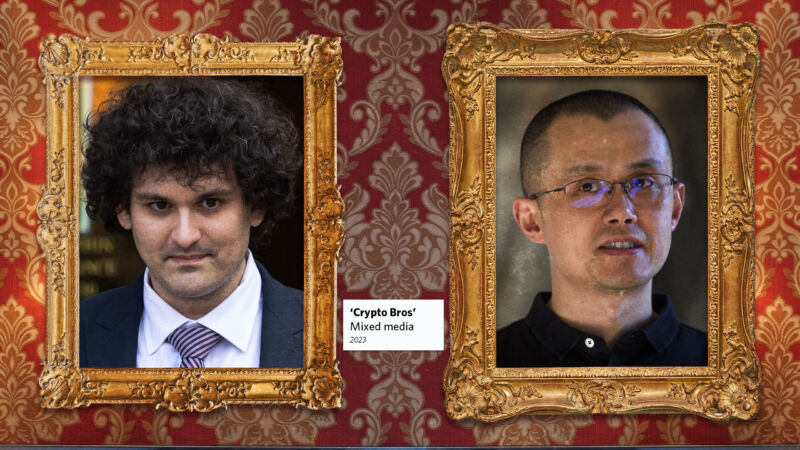Actor paid to pose as crypto CEO “deeply sorry” about $1.3 billion scam

Enlarge / A screenshot from Jack Gamble’s video outing Stephen Harrison as HyperVerse’s fake CEO, posted on Gamble’s “Nobody Special Finance” YouTube channel.
An actor who was hired to pretend to be the highly qualified CEO of a shady, collapsed cryptocurrency hedge fund called HyperVerse has apologized after a YouTuber unmasked his real identity last week.
An Englishman currently living in Thailand, Stephen Harrison confirmed to The Guardian that HyperVerse hired him to pose as CEO Steven Reece Lewis. Harrison told The Guardian that he was “deeply sorry” to HyperVerse investors—who lost a reported $1.3 billion after buying into a cryptocurrency-mining operation that promised “double or triple returns,” but did not exist, Court Watch reported.
Harrison claimed that he had “certainly not pocketed” any portion of those funds. Instead, he told The Guardian that he was paid about $7,500 over nine months. To play the part of CEO, he was also given a “wool and cashmere suit, two business shirts, two ties, and a pair of shoes,” The Guardian reported.
Harrison said that he had no part in HyperVerse’s alleged scheme to woo investors with false promises of high returns.
“I am sorry for these people,” Harrison said. “Because they believed some idea with me at the forefront and believed in what I said, and God knows what these people have lost. And I do feel bad about this.”
He also said that he was “shocked” to find out that HyperVerse had falsified his credentials, telling investors that Harrison was a fintech whiz—supposedly earning prestigious degrees before working at Goldman Sachs, then selling a web development company to Adobe before launching his own IT startup.
Harrison claimed that he only found out about this resume fraud when The Guardian investigated and found that nothing on his resume checked out.
“When I read that in the papers, I was like, blooming heck, they make me sound so highly educated,” Harrison told The Guardian.
He confirmed that he had received general certificates of secondary education but that his expertise was “certainly not on that level” that HyperVerse claimed that it was.
“They painted a good picture of me, but they never told me any of this,” Harrison told The Guardian.
Getting hired as fake CEO
According to The Guardian, Harrison was working as an unpaid freelance sports commentator when a “friend of a friend” told him about the HyperVerse gig.
The contract that Harrison signed was with an Indonesian-based talent agency called Mass Focus Ltd. It stated that he would be hired as “presenter talent,” The Guardian reported. However, The Guardian could find “no record of a company of this name on the Indonesian company register.”
Harrison’s agent allegedly told him that it was common for companies to hire corporate “presenters” to “represent the business” and reassured him that HyperVerse was “legitimate.”
Even after those assurances, Harrison said that he was still worried that HyperVerse might be a “scam,” researching the company online but ultimately deciding that “everything seemed OK.”
“So, I rolled with it,” Harrison told The Guardian.
Harrison said that promotional videos that he recorded as HyperVerse CEO were filmed in “makeshift studios” in Bangkok. He said that he was asked to start using the fake name Steven Reece Lewis while filming the second video. When he questioned why a fake name was necessary, HyperVerse allegedly told him that he was “acting the role.”
His agent allegedly told him that this was “perfectly normal” and after that, he “never went online and checked about Steven Reece Lewis,” he told The Guardian.
“I looked on YouTube occasionally, way back when they put the presentations up, but apart from that I was detached from this role,” Harrison said.
Over nine months, Harrison mostly worked one to two hours monthly, making videos posing as HyperVerse’s CEO.
There was also a Twitter account launched under the fake name Steven Reece Lewis. The Guardian noted that the date of Harrison’s final paycheck from HyperVerse “coincided with the last date the Twitter account was active,” but Harrison told The Guardian that he “had no oversight” of that account. When he was ending his stint as fake CEO, Harrison told The Guardian that he “requested that the Twitter account be shut down.”
Harrison also told The Guardian that he had “no contact at any point” with HyperVerse heads Sam Lee and Ryan Xu, exclusively dealing with a local contact in Thailand.
Actor paid to pose as crypto CEO “deeply sorry” about $1.3 billion scam Read More »


